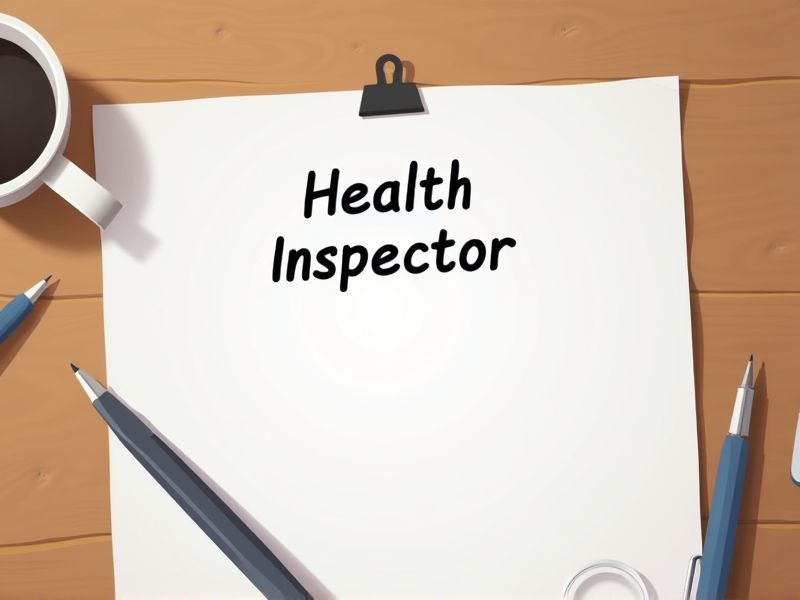
Health Inspectors play a critical role in ensuring public safety by assessing and enforcing health regulations. Their responsibilities often require technical expertise and a comprehensive understanding of industry standards. Certain certifications validate their skills and ensure they can effectively identify and mitigate health risks. Below are some essential certifications you may need for a Health Inspector role.
Certified Health Inspector (CHI)
Certified Health Inspectors possess verified knowledge and skills, ensuring they effectively identify and address public health risks. Their certification assures businesses and the public that inspections are conducted based on standardized protocols. They help maintain compliance with health regulations, preventing outbreaks of illnesses. Certification enhances trust and credibility between health departments and the communities they serve.
Registered Environmental Health Specialist (REHS)
The role of a Registered Environmental Health Specialist (REHS) is crucial because they possess specialized knowledge in public health regulations and environmental science. This expertise ensures that health inspections are conducted effectively, safeguarding public health by identifying and mitigating health risks in community environments. Their certification provides a standardized competency that aligns with legal and health standards, ensuring consistency and reliability during inspections. Moreover, REHS professionals can collaborate with other health agencies and stakeholders to promote health education and policy development.
Food Safety Manager Certification (FSMC)
Food Safety Manager Certification equips health inspectors with the necessary knowledge to identify potential hazards in food handling and preparation, effectively reducing the risk of foodborne illnesses. Proper certification ensures that inspectors are up-to-date with the latest food safety regulations and standards, enabling them to assess compliance accurately. Evidence shows that certified inspectors can provide more thorough and accurate evaluations, improving overall public health outcomes. Acquisition of FSMC by health inspectors fosters credibility, enhancing trust from both food establishments and the public.
Certified Food Protection Professional (CFPP)
Certified Food Protection Professionals (CFPP) provide essential expertise in identifying and mitigating food safety hazards, which directly impacts public health by reducing the risk of foodborne illnesses. Their specialized training ensures consistent and thorough inspection processes, promoting compliance with established food safety standards. By possessing a CFPP credential, health inspectors gain credibility and trust within the food industry, leading to higher compliance rates among food establishments. The CFPP certification aids in staying updated with evolving food safety regulations and best practices, enhancing the effectiveness of health inspections.
HACCP Certification
HACCP Certification equips health inspectors with a comprehensive framework to identify and manage food safety risks, ensuring public health protection. This certification validates their capability to enforce regulatory compliance, which helps reduce incidents of foodborne illnesses. With HACCP training, inspectors are better prepared to oversee food service establishments with consistent safety standards. The certification also enhances credibility and trust between inspectors and food businesses, facilitating more effective inspections and cooperation.
OSHA 30-Hour Certification
OSHA 30-Hour Certification provides health inspectors with comprehensive safety training, enhancing their ability to identify workplace hazards effectively. This certification ensures inspectors understand regulatory compliance, crucial for enforcing standards that protect public health. Health inspectors with OSHA training are better equipped to educate businesses on maintaining safe environments, reducing incident rates. Possessing this certification can enhance an inspector's credibility and professional standing, signaling a commitment to safety and expertise.
Certified Industrial Hygienist (CIH)
A Certified Industrial Hygienist (CIH) possesses in-depth knowledge of workplace hazards, enhancing the ability to identify and mitigate risks effectively during health inspections. Their specialized training in evaluating air quality, chemical exposure, and ergonomic issues ensures comprehensive assessments of industrial environments. The CIH credential signifies a commitment to ethical standards and evidence-based practices, fostering credibility and trust in health inspections. CIH professionals offer updated expertise on regulatory compliance, helping organizations avoid legal and financial repercussions associated with non-compliance.
Certified Infection Control Practitioner (CICP)
Certified Infection Control Practitioners ensure that health inspectors understand and apply the latest evidence-based infection control measures, reducing the spread of infectious diseases. Their expertise helps identify potential health risks and implement effective strategies in public health settings, promoting community safety. CICPs provide crucial insights and training in infection prevention, which enhances the overall effectiveness of health inspections. Their certification guarantees they remain updated on evolving pathogens and control methods, aligning with current health standards.
Water Quality Specialist Certification
Obtaining a Water Quality Specialist Certification for health inspectors ensures a thorough understanding of water safety standards, essential for preventing waterborne diseases. This certification enhances the inspector's ability to assess and manage water supply systems effectively, thereby safeguarding public health. It also increases credibility and trust in the inspector's evaluations, leading to more informed and accurate public health recommendations. Moreover, specialized training in water quality empowers inspectors to identify and mitigate potential environmental hazards linked to contaminated water sources.
Certified Hazardous Materials Manager (CHMM)
Health inspectors encounter various materials that could pose significant health risks, so having a Certified Hazardous Materials Manager ensures they have expertise in handling and assessing these substances. The CHMM certification equips inspectors with the skills needed to identify and mitigate hazards, protecting both public health and the environment. The presence of a CHMM in health inspections can lead to better compliance with safety regulations due to their comprehensive knowledge of hazardous materials management. Possessing this certification can enhance the reliability and effectiveness of health inspections, thereby preventing potential health crises.
Summary
When you attain certifications as a Health Inspector, your expertise becomes more credible. This recognition often leads to increased job prospects and potentially higher salaries. Employers are more likely to trust your assessments and recommendations. Enhanced skills allow you to ensure better regulatory compliance and public health safety.
